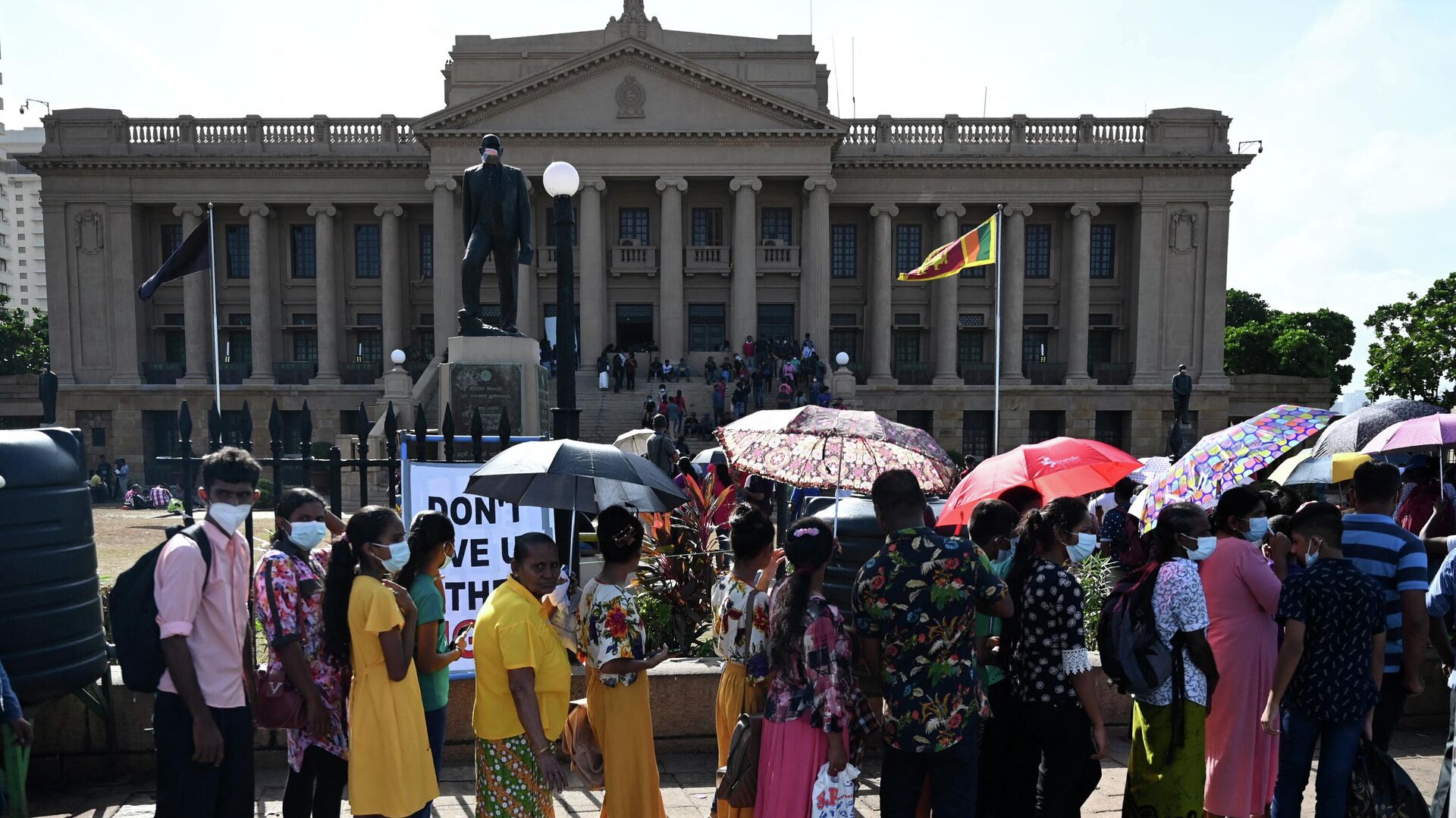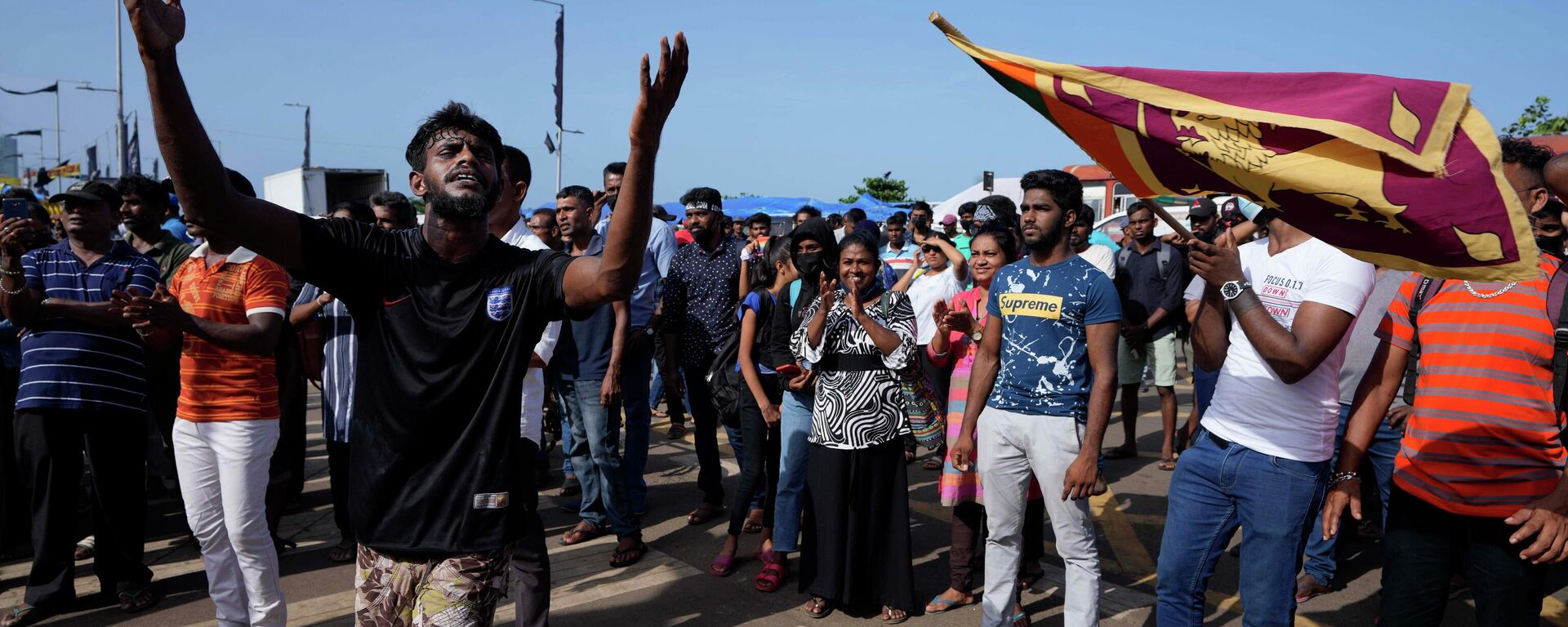https://sputnikglobe.com/20220722/eu-says-sri-lankan-democratic-transition-process-must-uphold-individual-rights-1097710319.html
EU Says Sri Lankan Democratic Transition Process Must Uphold Individual Rights
EU Says Sri Lankan Democratic Transition Process Must Uphold Individual Rights
Sputnik International
MOSCOW (Sputnik) - The High Representative on behalf of the European Union urged on Friday Sri Lankan authorities to uphold freedom of expression and... 22.07.2022, Sputnik International
2022-07-22T18:44+0000
2022-07-22T18:44+0000
2023-02-09T12:22+0000
sri lanka
transition period
european union (eu)
https://cdn1.img.sputnikglobe.com/img/07e6/07/0c/1097229513_0:0:3079:1731_1920x0_80_0_0_fa81e2efa666c750605bdc2ba342c2ba.jpg
"The EU underlines the need of upholding freedom of opinion and expression and individual rights of Sri Lankan citizens in the process of a democratic, peaceful and orderly transition," the EU's declaration on recent developments in Sri Lanka read.The EU condemns the unnecessary use of force against peaceful demonstrators in Sri Lanka and underscores the need to establish and implement a reforms plan."The urgency of the domestic situation requires the swift establishment and implementation of a structured plan of reforms in order to return the country's economy back onto a sustainable path. In this context, it is essential to safeguard human rights and the rule of law while fostering good and inclusive governance and promoting reconciliation efforts," the declaration said.The EU vows to support Sri Lanka's economic recovery efforts and advancing its reconciliation agenda. On July 9, Colombo, Sri Lanka's capital, was rocked by thousand-strong protests, caused by public discontent over the government's inefficiency in addressing the economic crisis. Few days after the protests erupted, demanding resignation of the country's president and prime minister, President Gotabaya Rajapaksa fled the country and submitted his resignation. Several days later, former head of cabinet Ranil Wickremesinghe was elected as new president and Dinesh Gunawardena was sworn in as prime minister.
https://sputnikglobe.com/20220721/rule-of-law-in-sri-lanka-offers-hope-for-protesters-despite-new-setback-1097650307.html
sri lanka
Sputnik International
feedback@sputniknews.com
+74956456601
MIA „Rossiya Segodnya“
2022
Sputnik International
feedback@sputniknews.com
+74956456601
MIA „Rossiya Segodnya“
News
en_EN
Sputnik International
feedback@sputniknews.com
+74956456601
MIA „Rossiya Segodnya“
Sputnik International
feedback@sputniknews.com
+74956456601
MIA „Rossiya Segodnya“
sri lanka, transition period, european union (eu)
sri lanka, transition period, european union (eu)
EU Says Sri Lankan Democratic Transition Process Must Uphold Individual Rights
18:44 GMT 22.07.2022 (Updated: 12:22 GMT 09.02.2023) MOSCOW (Sputnik) - The High Representative on behalf of the European Union urged on Friday Sri Lankan authorities to uphold freedom of expression and individual rights in the democratic transition process.
"The EU underlines the need of upholding freedom of opinion and expression and individual rights of Sri Lankan citizens in the process of a democratic, peaceful and orderly transition," the EU's declaration on recent developments in Sri Lanka read. The EU condemns the unnecessary use of force against peaceful demonstrators in Sri Lanka and underscores the need to establish and implement a reforms plan.
"The urgency of the domestic situation requires the swift establishment and implementation of a structured plan of reforms in order to return the country's economy back onto a sustainable path. In this context, it is essential to safeguard human rights and the rule of law while fostering good and inclusive governance and promoting reconciliation efforts," the declaration said.
The EU vows to support Sri Lanka's
economic recovery efforts and advancing its reconciliation agenda.
On July 9, Colombo, Sri Lanka's capital, was rocked by thousand-strong protests, caused by public discontent over the government's inefficiency in addressing the economic crisis. Few days after the protests erupted, demanding resignation of the country's president and prime minister, President Gotabaya Rajapaksa fled the country and submitted his resignation. Several days later, former head of cabinet Ranil Wickremesinghe was elected as new president and Dinesh Gunawardena was sworn in as prime minister.


